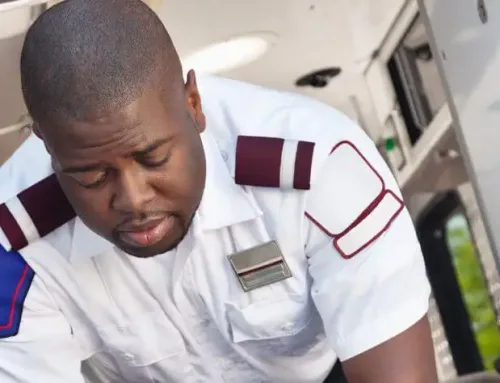The Best Degree for a Physician Assistant: Choosing the Right Path
The best degree for a Physician Assistant is one that prepares students for the rigorous demands of PA school while meeting essential prerequisites. As the healthcare industry expands, the demand for Physician Assistants (PAs) is skyrocketing, offering a rewarding career with strong job security, competitive salaries, and the ability to provide hands-on patient care.
Choosing the right undergraduate degree can make all the difference when applying to PA programs. A strong foundation in health sciences, anatomy, and patient care increases acceptance chances and ensures a smoother transition into graduate studies. At SCU, our Bachelor of Science in Health Sciences (BSHS) provides a flexible, transfer-friendly path that aligns with PA school requirements—giving students an efficient and effective way to reach their goals.
Physician Assistants—One of The Fastest-Growing Role in Medicine
Physician Assistants (PAs) are essential members of modern healthcare teams, providing diagnoses, treatment plans, and direct patient care. They work alongside doctors, often serving as the first point of contact for patients in hospitals, clinics, and surgical units.
With the demand for healthcare professionals rising, the PA profession is growing rapidly, offering strong salaries and career stability. But what exactly does a Physician Assistant do on a daily basis? Let’s take a deeper look.
What Is a Physician Assistant?
A Physician Assistant (PA) is a licensed medical professional trained to diagnose illnesses, develop treatment plans, and prescribe medication under the supervision of a physician. PAs have a wide scope of practice, working in primary care, emergency medicine, surgery, and specialty fields like cardiology and dermatology.
Responsibilities of a Physician Assistant
The day-to-day responsibilities of a PA depend on their specialty and work setting. However, core duties often include:
- Conducting physical exams: Evaluating patients, assessing symptoms, and ordering diagnostic tests.
- Assisting in surgical procedures: Providing support in the operating room and managing post-operative care.
- Treating chronic and acute conditions: Managing illnesses like diabetes, infections, and hypertension while educating patients on long-term health strategies.
Salary Outlook
The PA profession is projected to grow by 28% by 2033, making it one of the fastest-growing careers in healthcare. With a median salary of $130,020 per year, it’s a career that offers both financial stability and meaningful patient impact. As healthcare needs increase, PAs will continue playing a crucial role in delivering quality care.
The Best Degrees for Becoming a Physician Assistant
Becoming a Physician Assistant (PA) starts with the right education. PA programs require a bachelor’s degree plus essential prerequisite coursework in science and healthcare-related fields. Choosing the best major can increase your chances of acceptance and prepare you for the rigors of PA school.
So, what degree will set you up for success? While many students choose Biology, Kinesiology, or Pre-Med, degrees in Health Sciences also provide a well-rounded education that includes both science courses and clinical knowledge. Let’s break down the best degree options for future PAs.
Understanding PA School Requirements
PA schools require a bachelor’s degree plus specific science prerequisites. The most important requirements include:
GPA Expectations: Most programs require at least a 3.0 GPA, but competitive applicants typically have 3.5 or higher.
Core Coursework:
- Biology: Anatomy, Physiology, Microbiology.
- Chemistry: General, Organic, Biochemistry.
- Psychology & Behavioral Sciences: Foundations in patient care and mental health.
- Medical Terminology: Essential for understanding clinical language.
Since PA programs are academically intense, choosing a degree that covers both science and healthcare coursework is crucial.
Common Pre-PA Degrees & Their Advantages
There are several degree paths that prepare students for PA school, each with its own benefits:
- Biology or Pre-Med: A solid science background but may lackhands-on healthcare experience.
- Health Sciences: Covers both science prerequisites and clinical knowledge, making it an ideal choice.
- Kinesiology & Exercise Science: Great for those interested in sports medicine or rehabilitation.
- Nursing: A good fit for those who want to gain patient care experience before applying to PA school.
Your Fast-Track to PA School: How SCU’s BSHS Gives You an Edge
Getting into Physician Assistant (PA) school is competitive, and the right undergraduate degree makes all the difference. At Southern California University of Health Sciences (SCU), our Bachelor of Science in Health Sciences (BSHS) program provides pre-PA students with the science coursework, healthcare knowledge, and hands-on experience that top PA programs look for.
But we don’t stop there. SCU’s BSHS graduates who meet specific requirements are guaranteed an interview with our Master of Science: Physician Assistant Program (PA)—a major advantage in an increasingly selective admissions process.
SCU’s BSHS Program Overview
Our fully online BSHS program is designed for students planning to apply to PA school. It provides:
- A flexible curriculum that allows students to complete prerequisites at their own pace.
- Core science coursework required for PA school applications, including biology, chemistry, and human physiology.
- Transfer-friendly options for students who want to customize their degree and apply previous credits.
SCU Concentrations for PA School
To help students tailor their education, we offer specialized concentrations that align with PA school requirements and clinical career paths.
- Functional Anatomy: Focuses on musculoskeletal and movement sciences, ideal for students interested in sports medicine or orthopedics. Prepares students for hands-on patient care roles before PA school.
- Human Genetics and Genomics: Covers genetic disorders, personalized medicine, and disease risk analysis. A great option for students interested in genetic counseling, primary care, or medical research.
- Health Education CHES® Preparation: Prepares students for public health roles while completing PA prerequisites. Leads to the Certified Health Education Specialist (CHES®) certification, a credential that enhances a PA school application and opens doors in health advocacy and education.
We offer even more concentrations designed to align with various healthcare careers. Explore all available options here.
Physician Assistant Program Interview Guarantee
PA school admissions are highly competitive, but SCU gives our BSHS graduates a significant advantage. Students who meet specific academic and admissions criteria are guaranteed an interview with SCU’s Master of Science: Physician Assistant Program (PA).
This means:
- No fighting for a spot in the applicant pool.
- A direct pathway to advancing your education without unnecessary delays.
- The confidence of knowing your degree is recognized and valued by a PA program.
This exclusive opportunity gives students a major edge in the PA school admissions process and helps turn career goals into reality.
Fixed-Rate Tuition & Scholarships
We believe in making education affordable and predictable. Our Fixed-Rate Tuition Guarantee ensures that students lock in their tuition from start to finish, avoiding unexpected cost increases.
Additionally, we offer multiple scholarship opportunities to help students lower the financial burden of their degree while focusing on what matters—getting into PA school and building a future in healthcare.
Want to Stand Out Further? Here’s How to Strengthen Your PA School Application
Getting into Physician Assistant school isn’t just about good grades. Admissions committees want applicants with clinical experience, strong test scores, and direct exposure to the PA profession. A well-rounded application makes all the difference in securing an interview—and an acceptance letter.
If you’re wondering how to make your PA school application stand out, here’s what you need to know.
Clinical Experience & Patient Care Hours
Most PA programs require between 500 and 2,000 hours of hands-on healthcare experience before applying. Working in direct patient care shows competence, commitment, and real-world medical skills. Some of the best entry-level healthcare jobs for PA applicants include:
- Medical Assistant (MA): Assists in clinics and physician offices with basic procedures.
- Emergency Medical Technician (EMT): Provides hands-on experience in emergency care.
- Certified Nursing Assistant (CNA): Helps patients with daily needs in hospitals and nursing homes.
- Physical Therapy Aide: Works with patients recovering from injuries and surgeries.
Many PA students have stories of how working in these roles shaped their medical knowledge—like an EMT who learned firsthand how to manage patient crises before stepping into PA school.
Shadowing & Volunteering in Healthcare
PA programs highly value shadowing experience, especially with practicing Physician Assistants. Observing PAs in hospitals, clinics, and urgent care centers provides insight into their role and patient interactions.
Finding shadowing opportunities can take persistence, but networking with local clinics, hospitals, and PA mentors is a great way to start. Volunteering in free clinics or underserved communities can also boost an application while providing meaningful hands-on experience.
Excelling on the GRE (or PA-CAT)
Some PA programs require the GRE or PA-CAT as part of the admissions process. Scoring above the 50th percentile can make a difference in competitive programs.
- Study consistently: Use prep books, online resources, and practice exams.
- Focus on weak areas: Identify sections where you struggle and prioritize them.
- Consider a test prep course: Structured programs can help boost scores for those needing extra support.
The stronger your PA school application, the better your chances of earning a spot in a top program. Start now, gain experience, and make every part of your application count.
The Right Degree Makes All the Difference—And SCU Can Help
Choosing the best degree for Physician Assistant school is a crucial step in the admissions process. A strong academic foundation, hands-on experience, and healthcare-focused coursework will set you apart from other applicants. PA programs look for well-rounded candidates with science proficiency and real-world clinical exposure, making the right undergraduate degree essential.
At SCU, our Bachelor of Science in Health Sciences (BSHS) is tailored for future PA students, offering the flexibility, coursework, and healthcare knowledge needed for PA school. Plus, eligible graduates receive a guaranteed interview for our Master of Science: Physician Assistant Program. Want to get started? Explore our program, review admissions, and apply today to start your journey toward a rewarding PA career.
FAQs
What is the best degree for Physician Assistant school?
The best degree for Physician Assistant school is one that covers PA program prerequisites, such as biology, chemistry, anatomy, and healthcare experience. Degrees in Health Sciences, Biology, or Kinesiology are popular choices, offering well-rounded preparation for both coursework and patient care experience.
Do I need a science degree to apply to PA school?
Not necessarily, but you must complete science-heavy prerequisites like biology, chemistry, and anatomy. Many students with degrees in psychology or public health apply, but they often need to take additional courses to meet PA school requirements.
Does SCU’s BSHS program give students a PA school advantage?
Yes! BSHS graduates who meet specific requirements are guaranteed an interview for SCU’s Master of Science: Physician Assistant Program (PA)—a huge benefit in today’s competitive PA admissions process.
What financial aid options are available for SCU’s BSHS program?
We offer a Fixed Rate Tuition Guarantee to ensure cost stability, along with multiple scholarship opportunities to help students fund their education. Check out our financial aid page to explore your options!
Can I complete SCU’s BSHS program online?
Yes! Our fully online BSHS program allows students to study full-time or part-time, making it easy to balance education with work and healthcare experience hours.
Related Posts





